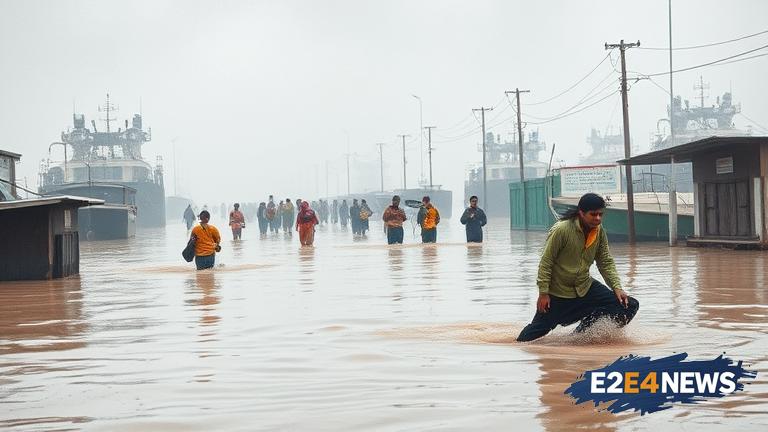Heavy monsoon rains have been pounding eastern Pakistan and India, resulting in severe flooding that has forced thousands of people to evacuate their homes. The flooding has been particularly severe in the eastern provinces of Pakistan, where the monsoon rains have caused rivers to overflow and inundate surrounding areas. In India, the states of Bihar and Uttar Pradesh have been hardest hit, with reports of widespread flooding and damage to homes and infrastructure. The Indian government has deployed troops to assist with rescue efforts, and has set up relief camps to provide shelter and aid to those affected. In Pakistan, the government has also launched a relief effort, with the military and emergency services working to evacuate people and provide aid. The flooding has been exacerbated by the heavy rainfall, which has been caused by a low-pressure system that has been moving slowly over the region. The monsoon season, which typically runs from June to September, has been particularly severe this year, with many areas receiving above-average rainfall. The flooding has caused significant damage to homes, roads, and other infrastructure, and has disrupted communication and transportation links. Many people have been forced to take shelter on higher ground, or in relief camps, where they are being provided with food, water, and medical care. The situation is being closely monitored by authorities, who are working to provide aid and assistance to those affected. The flooding has also had a significant impact on agriculture, with many crops being destroyed or damaged. The economic impact of the flooding is likely to be significant, with many businesses and industries being affected. The government has announced plans to provide financial assistance to those affected, and to support the recovery efforts. The international community has also been providing aid and assistance, with many countries and organizations offering support. The situation is being closely watched by humanitarian organizations, who are working to provide aid and assistance to those in need. The flooding has also raised concerns about the impact of climate change, which is believed to be contributing to the increasing frequency and severity of extreme weather events. The government has announced plans to take steps to mitigate the impact of climate change, and to improve the country’s resilience to natural disasters. The flooding has also highlighted the need for improved infrastructure and disaster preparedness, and the government has announced plans to invest in these areas. The situation is expected to continue for several days, with more heavy rainfall forecast for the region. The government has urged people to remain vigilant and to follow evacuation orders, and has warned of the risks of further flooding and landslides. The international community is continuing to monitor the situation, and is providing support and assistance to those affected.
